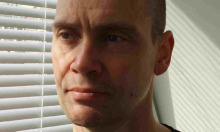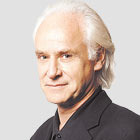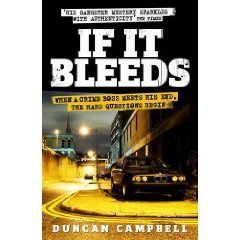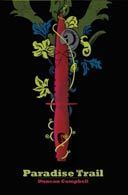Matt Rees's Blog - Posts Tagged "the-guardian"
Guardian: Top 10 Arab-world novels
"The Arab literary world and Western publishing don't cross over much. The literature of the Arab world is largely unknown in the west, and even westerners who write about Arabs are sometimes seen as fringe, cult writers. That comes at a cost to the west, because literature could be such an important bridge between two cultures so much at odds. What we see of the Arab world comes from news reports of war and other madness. Literature would be a much more profound contact.
"I live in Jerusalem and write fiction about the Palestinians because it's a better way to understand the reality of life in Palestine than journalism and non-fiction. The books in this list, in their different ways, unveil elements of life across the Arab world that you won't see in the newspaper or on TV."
Published on January 13, 2010 23:17
•
Tags:
abdulrahman-munif, ala-al-aswany, algeria, arab, arab-fiction, arab-novels, british-newspapers, cairo, egypt, emile-habiby, ibrahim-nasrallah, iraq, israel, kanaan-makiya, lawrence-durrell, middle-east, naguib-mahfouz, palestine, palestinians, paul-bowles, tariq-ali, the-guardian, yasmina-khadra
Euro Bestsellers, UK-US Blockbusters
 Crime novelist Simon Beckett wrote a few days ago in The Guardian that he’d had no idea he was the best-selling British novelist in Europe until statistics were announced last month. Not surprising, because at home no one has a clue who he is.
Crime novelist Simon Beckett wrote a few days ago in The Guardian that he’d had no idea he was the best-selling British novelist in Europe until statistics were announced last month. Not surprising, because at home no one has a clue who he is.The n author of a series about a forensic anthropologist (hard to define, but it involves a lot of descriptions of decomposing bodies in gruesome detail, which’re rather well done) recounts his astonishment that he plays to big crowds, in particular in Germany.
I can vouch for this. I saw him in Hamburg at a festival at which I also appeared last year. He read before a crowd that filled a hall the size of an aircraft hangar and which treated him as if he were Brad Pitt. I was quite surprised by the women rushing his signing table. I'm not German -- I hadn't the foggiest notion who this fellow was.
Meanwhile, at home in Sheffield, Yorkshire, acquaintances approach Beckett wondering if he can make a living from writing, unaware that he’s sold millions of books. Unaware, because hardly any of them are sold in the UK.
Beckett’s article highlights a phenomenon among writers – not just in the crime genre. I come across quite a few novelists from the UK and the US who’re best sellers in European countries, but can’t get more than a handful to turn up for readings in their home countries. I think there’s more to this than differences in national reading tastes.
Though Beckett claims to be bemused by his situation, I think it can be explained by the differences in the ways books are sold in the US/UK and in Europe. American and British bookshops (and publishers) see their business as being carried by a few blockbuster books. A New York Times Magazine profile of James Patterson by Jonathan Mahler last month highlighted this trend and the effect it has on other non-blockbuster books. Anyone not on the blockbuster trajectory can find it hard to set up readings in stores and almost impossible to get journalists (tv, radio or print) to do interviews.
When I’ve traveled in Europe, however, I find myself touring smallish bookshops which consider it a necessary part of their business to host writers. Then there's a broad array of literary festivals, too. In each city, there’s a wide range of media ready to do interviews, even with first-time authors. Consequently a book not of the blockbuster type can attract publicity which – in the US and UK – would rarely be given to anything but a blockbuster author whose name you (and the journalist concerned) already heard a thousand times.
I suspect this won’t change soon. Why not?
For one thing, booksellers are more conservative in their ordering than ever. Largely due to the economic crisis – which resulted in Barnes and Noble having a dreadful 2009 – and insecurity about the future of publishing in an e-book age, big stores are ordering ahead only for one month at a time, rather than the three months or more publishers are accustomed to. That makes it hard for publishers to plan a big print run for all but the sure things.
As if things weren’t bad enough in publishing, the situation is compounded by worries in the journalism world. It’s hard for a journalist to take a stand against market trends these days. I’m a former journalist and I can state categorically that if there’s one group of people with more qualms about what the future holds for their industry than publishers, it’s journalists.
So how to get around this? Well, if you're a reader, why not follow the German bestseller lists? Here's one which recommends the best new crime novels each month. You'll find a broader range of reading and books which might surprise you. You'll also be ahead of the sales figures back home and be able to get a front row seat at the scantily attended readings of the next Simon Beckett.
Published on February 13, 2010 10:05
•
Tags:
bestsellers, blockbusters, bookshops, crime-fiction, david-hunter, germany, hamburg, james-patterson, jonathan-mahler, new-york-times-magazine, publishing, simon-beckett, the-guardian
The UK Crime Fiction Insider: Duncan Campbell's Writing Life
 One of the great pleasures of life as a writer is being paired with interesting authors when you speak at book fairs. (It's also an occasional rough ride when you find yourself stuck with a bum who can't write, but I'm being nice here so I won't go into any of those.) The most delightful fellow I've ever met in this way is Duncan Campbell with whom I was paired at the book fair in his native Edinburgh two years ago. He also happens to be the British crime writer with the best knowledge of the UK's criminal fraternity -- which he covered for three decades for The Guardian, famously managing to be liked by all the old lags he wrote about. His latest novel, "If It Bleeds," focuses on the nexus of crime and crime journalism. It's hilarious and rather chilling -- particularly so for an ex-journalist such as myself whose nightmares are much more likely to take place in a newsroom than in criminal haunts. Duncan's previous novel "The Paradise Trail" drew on his experience of the "hippie trail" in India in the early 1970s. Like "If It Bleeds," it drew on his own experiences, but had much more than mere authenticity -- drugs, dirt, noise and hippie naivete -- to recommend it. In a review, my esteemed fellow Welshman (and former hashish kingpin) Howard Marks wrote: "The dialogue...is the wittiest I have read in any work of fiction, including Catch-22, my hitherto favourite. The fascinating historical and cultural context is unobtrusively drip-fed, and the whodunit suspense masterfully created." He also said the drug stuff was on the money. Here's Duncan on writing and on the life he lives around it:
One of the great pleasures of life as a writer is being paired with interesting authors when you speak at book fairs. (It's also an occasional rough ride when you find yourself stuck with a bum who can't write, but I'm being nice here so I won't go into any of those.) The most delightful fellow I've ever met in this way is Duncan Campbell with whom I was paired at the book fair in his native Edinburgh two years ago. He also happens to be the British crime writer with the best knowledge of the UK's criminal fraternity -- which he covered for three decades for The Guardian, famously managing to be liked by all the old lags he wrote about. His latest novel, "If It Bleeds," focuses on the nexus of crime and crime journalism. It's hilarious and rather chilling -- particularly so for an ex-journalist such as myself whose nightmares are much more likely to take place in a newsroom than in criminal haunts. Duncan's previous novel "The Paradise Trail" drew on his experience of the "hippie trail" in India in the early 1970s. Like "If It Bleeds," it drew on his own experiences, but had much more than mere authenticity -- drugs, dirt, noise and hippie naivete -- to recommend it. In a review, my esteemed fellow Welshman (and former hashish kingpin) Howard Marks wrote: "The dialogue...is the wittiest I have read in any work of fiction, including Catch-22, my hitherto favourite. The fascinating historical and cultural context is unobtrusively drip-fed, and the whodunit suspense masterfully created." He also said the drug stuff was on the money. Here's Duncan on writing and on the life he lives around it:How long did it take you to get published?
I was lucky. I had written an article about Billy Connolly, the terrific Scottish comedian, in Time Out magazine. It was 1975 and he was just about to become very big so Pan, the publishers, wanted a speedy book about him. They asked me if I would like to go on tour with him and write it, with his cooperation. You kidding?
Would you recommend any books on writing?
George Orwell’s essay, Politics and the English Language. The Guardian (where I worked for 22 years, ) Style Book is very helpful.
What’s a typical writing day?
When I was a carefree, young freelance journalist, I would write until the early hours of the morning, with music playing in the background. Now I do all my ‘best work’ ho, ho, in the morning. When I wrote my two novels, I worked a five-day week and aimed for 2000 words a day. I thought this was impressive but an old pal, Jim McClure, who very sadly died a couple of years ago, told me that when he wrote his great prize-winning South African crime novels, he would work from 9 am till 5 am every day for two weeks and have a book at the end of it. He was South African but, obviously, with Scottish Calvinist roots.

Plug your latest book. What’s it about? Why’s it so great?
It’s called If It Bleeds, (Headline) which is taken from the old newsroom motto - ‘if it bleeds, it leads’, i.e., if it’s about murder and gore, it goes on the front page or at the top of a news bulletin. It’s about a 50-something crime reporter called Laurie Lane who is asked by an old London gangster, Old Man Hook, to ghost his autobiography. Soon after that, the gangster is shot dead. Laurie has his own problems as his country singer wife has left him for an older man, his teenage daughter is meant to be doing her A levels and he is being investigated by his digitally-snooty news editor for fiddling his expenses. (I promise you, it’s not autobiographical.) Can Laurie find out who killed the gangster and save his job? Could it be the Russian hoods who want a slice of the Hooks’ clubland business? The gangster’s own family? Bent coppers? What’s the Thailand connection? So it’s about crime and crime reporting and bad jokes told by a veteran crime reporter called ‘the Vicar’. Now read on...
How much of what you do is:
a) formula dictated by the genre within which you write?
b) formula you developed yourself and stuck with?
c) as close to complete originality as it’s possible to get each time.
I think most of us are slaves - or at least indentured labour - to the genres in which we work. My earliest ‘grown up’ reading was Agatha Christie and I read as many of her as I could. I went on to lots of Graham Greene and Evelyn Waugh. Their ghosts must hover somewhere.
What’s your favorite sentence in all literature, and why?
Anything by Groucho Marx on a good day.
What’s the best descriptive image in all literature?
John Kennedy Toole creates some spectacular images in A Confederacy of Dunces.
Who’s the greatest stylist currently writing?
Someone just gave me an old copy of James Cameron’s Point of Departure, which I had not read for a while. He writes with lucidity, grace, humour. Quite a feat. Scottish, of course. I know he’s dead but his copy is as alive as ever.
Who’s the greatest plotter currently writing?
Gosh. Tempted to say Alistair Campbell (no relation.) John le Carre?

How much research is involved in each of your books?
I’ve written three non-fiction books on crime: That Was Business, This Is Personal; The Underworld; and A Stranger and Afraid. They all required quite a lot of research which I - mostly - enjoyed. The two novels, The Paradise Trail and If It Bleeds, were both the result of decades and decades of diligent research which I imagined, at the time, was life.
Where’d you get the idea for your main character?
Pathetically, the main characters in both novels have a lot of me in them.
Do you have a pain from childhood that compels you to write? If not, what does?
I think if I had had a more painful childhood, I might have been a better writer. But who do you complain to?
What’s the best idea for marketing a book you can do yourself?
If you are a journalist working for a publication, you can always try and persuade the features department to run a piece to coincide with a book’s publication. Fortunately, the places I have worked have had the sweetest, most decent and, I would say, the most perceptive of people working in those departments.
What’s your experience with being translated?
If I could speak a word of Swedish or Norwegian, I would let you know.
Do you live entirely off your writing? How many books did you write before could make a living at it?
I have always lived off my ‘writing’ but that has mainly been journalism. I don’t know many people who make a living solely from books.
How many books did you write before your first one was published?
I wrote a book called The Walking Wounded in 1972, which was based in Calcutta and which was sensibly rejected by a publisher in San Francisco at the time. I hung on to the manuscript for 32 years and used it as source material for The Paradise Trail. Waste not, want not.
What’s the strangest thing that happened to you on a book tour?
I can’t say at the moment because I want to make use of it, in a slightly shameful way, in a book which I have yet to write.
What’s your weirdest idea for a book you’ll never get to publish?
I’d like to do a graphic novel about crime but am hampered by the fact that I can’t draw.
Published on February 23, 2010 10:07
•
Tags:
billy-connolly, british-crime-fiction, catch-22, crime-fiction, duncan-campbell, edinburgh, edinburgh-book-fair, evelyn-waugh, george-orwell, graham-greene, groucho-marx, hippie-trail, hippies, howard-marks, if-it-bleeds, india, scotland, the-guardian, the-paradise-trail, time-out
Crime fiction’s ‘French porn’: Martin Walker’s Writing Life interview
 Martin Walker’s series of crime novels about the chief of police of a small town in the beautiful Perigord region of France are a delight. When we met at a recent “British Crime Fiction Night” in Darmstadt, Germany, he described the books as “French porn – wine, food, women – in a crime fiction frame.” Certainly Martin’s bon vivant personality matches the playfulness of his fiction (Though he's a Scot by birth, he divides his time between Washington DC and his vineyard in France). But he’s also a former correspondent with The Guardian and his novels have significant undertones of social commentary, as you’ll see from the interview here. By mixing the pleasures of France – the “porn” – with its dark underside, the Bruno novels remind me very much of the terrific Inspector Montalbano series, where the Sicilian setting is the beautiful backdrop to a detective who enjoys a good dinner as much as nabbing the villain. So here’s Martin Walker, the Andrea Camilleri of the Dordogne.
Martin Walker’s series of crime novels about the chief of police of a small town in the beautiful Perigord region of France are a delight. When we met at a recent “British Crime Fiction Night” in Darmstadt, Germany, he described the books as “French porn – wine, food, women – in a crime fiction frame.” Certainly Martin’s bon vivant personality matches the playfulness of his fiction (Though he's a Scot by birth, he divides his time between Washington DC and his vineyard in France). But he’s also a former correspondent with The Guardian and his novels have significant undertones of social commentary, as you’ll see from the interview here. By mixing the pleasures of France – the “porn” – with its dark underside, the Bruno novels remind me very much of the terrific Inspector Montalbano series, where the Sicilian setting is the beautiful backdrop to a detective who enjoys a good dinner as much as nabbing the villain. So here’s Martin Walker, the Andrea Camilleri of the Dordogne.How long did it take you to get published?
Not long at all. My first book, non-fiction, was commissioned. My first Bruno novel sold as soon as my agent offered it.
Would you recommend any books on writing?
No. Just read and read and read and get a feel for what works.
What’s a typical writing day?
There isn’t one, but whether on a plane or a train or at home or in a hotel I try and do at least a thousand words a day.
Plug your latest book. What’s it about? Why’s it so great?
The latest book is ‘The Dark Vineyard,’ third in the Bruno series, which is about fraud in the truffle market in France, which traces back to China and to consequences of France’s 1954 defeat in its failed colonial war in Vietnam. Along the way, it involves militant Greens, a lot of wonderful French food and the complex romantic life of my hero, Bruno. I think it’s my best Bruno novel yet, because he seems to grow as a character with each book and my portrait of modern France gets richer. While writing it, I more than once had that magical experience of a character doing something I had neither planned nor expected, as if Bruno was taking on a life of his own.
Read the rest of this post on my blog The Man of Twists and Turns.<\a>
Published on October 15, 2010 23:51
•
Tags:
andrea-camilleri, bruno-chief-of-police, cj-sansom, crime-fiction, dordogne, france, ian-rankin, inspector-montalbano, interviews, martin-walker, neal-stephenson, perigord, philip-roth, the-guardian, the-writing-life, washington-dc, writers
Ikea and the Crime Writer
 There are many theories as to why Scandinavian crime writers prosper in the bestseller lists. But I know why it is. Ikea.
There are many theories as to why Scandinavian crime writers prosper in the bestseller lists. But I know why it is. Ikea.I just bought a new set of Ikea shelves for my office. I’ll get into exactly how that has altered the configuration of my workspace, but at this point let me just note that it makes my writing room seem a thousand times more orderly, less cluttered. As any feng shui expert would tell you, a disorganized room will yield fractured thoughts and fill the mind of its occupier with distraction. For a writer who needs to focus on his manuscript and whose manuscript requires a consistent vision, that’s a bad thing.
So these shelves, produced by a company based in Sweden, have no doubt created the clean, neat spaces Scandinavian crime writers like Henning Mankell and Jo Nesbo need to write their clean, neat stories.
I was in need of a little neatening in my office, because my research had started to create clutter. There were piles of books on Mozart, music and the Austrian Empire related to my forthcoming historical crime novel MOZART’S LAST ARIA. Then new mountains of books and documents for CARAVAGGIO ON FIRE, my novel about the Italian artist which will be out in a year and a half.
But that’s not all. For my Mozart book, I learned the piano. So suddenly there’s a piano in my office. For Caravaggio, I’ve been learning to paint with oils, so there’s an easel and painting implements and canvases jostling for space with my guitars and bass guitars and amplifiers (those aren’t research; it’s a hobby).
Add to that the large numbers of foreign editions of my books I’m delighted to receive when I’m published in Indonesia and Romania and Iceland, but which I’m unable to give to friends due to the fact that I only know one Icelander, my Romanian landlord already read the book, and the only Indonesian I know is my editor and of course he has already read the book, too.
Read the rest of this post on my blog The Man of Twists and Turns.
Published on December 09, 2010 01:07
•
Tags:
caravaggio, caravaggio-on-fire, crime-fiction, feng-shui, henning-mankell, iceland, ikea, indonesia, italy, jo-nesbo, mozart, mozart-s-last-aria, romania, sweden, the-guardian, writers-rooms, writing
Writing Tip #93: Real historical charcters in a novel
 I dislike the law and I have little interest in ethics. So here’s a post about the ethics and legality of using real characters in fiction, as I do in my latest novel MOZART’S LAST ARIA. It’s the one time I’ll bother to write about either subject.
I dislike the law and I have little interest in ethics. So here’s a post about the ethics and legality of using real characters in fiction, as I do in my latest novel MOZART’S LAST ARIA. It’s the one time I’ll bother to write about either subject.In a Fringe Magazine review of MOZART’S LAST ARIA, reviewer Scott Wilson notes how much he enjoyed the book. (“This story was extremely well-written and up there with many other great whodunit books. The narrative is both beautiful and historically accurate, as are many other elements of this crime novel. It is obvious that Rees did some pretty extensive research in developing the foundation for this book. I found the pages of the book turning themselves with the ripping read and sense of urgency that the author created with the plot.”)
Thanks, Scott. Reviews don’t get much better than that.
But my novel also touched off another thought in Scott that’s worth looking at in more depth. Here’s what he wrote:
Mozart’s Last Aria is one of those books that amazes me. I don’t know how you can write a fictional novel based on a real person without being sued for slander or defamation etc etc. I mean the concept of using a real, historical figure and adding elements of fiction to make an interesting story has some merit to it and in some cases, such as this book, it makes a great read. But I just don’t understand how you can get sued for plagiarism by using someone else’s song lyrics or stories, but to take a person’s life and write what every the hell you want about it is okay??? Don’t imagine being able to write a novel based on Han Solo or Sherlock Holmes and being able to make millions without it being an issue to anyone else? I’m going to have to do some research into the legalities of writing a fictional novel based on real people for my own curiosity now.
There are a few issues raised in this paragraph. The first is: what’s legal? My understanding, in very blunt terms is: as long as the person is dead, they can be fictionalized.
That’s how you come to have real Hollywood actor Sal Mineo as a gigolo in James Ellroy’s novels. Or Lee Harvey Oswald in Don de Lillo’s “Libra.” Or Virginia Woolf in “The Hours.” If they were still alive, they might’ve sued. Or Mineo would’ve had the mob knee-cap Ellroy, Oswald might’ve assassinated de Lillo, and Woolf may have attempted to beat Michael Cunningham to death with the enormous false nose Nicole Kidman wore in the film version.
But they didn’t. Because they’re dead. Like Mozart. (In fact, my novel is about what really caused his death, so that’d have to be the point.)
So let’s get to the ethics. A fairly silly “outraged” blog on The Guardian website a couple of years ago suggested that “increased” use of real dead famous people by novelists was an ethical issue and that it was the result of the decline of privacy and private space in the age of Twitter, Facebook and My Space (thus revealing that the blogger wasn’t really up on the latest developments with My Space, which has been called the “abandoned theme park of the internet” for years now.) By going inside the heads of famous dead people, novelists reveal themselves to care not a jot for privacy, he writes.
Actually, I agree that the privacy of dead people is an issue of little importance, in a world riven by war, rapine, and investment bankers. There are bigger fish to fry.
Read the rest of this post on my blog The Man of Twists and Turns.
Published on July 07, 2011 04:46
•
Tags:
crime-fiction, han-solo, historical-fiction, mozart-s-last-aria, sherlock-holmes, the-fringe-magazine, the-guardian, writing, writing-tips



